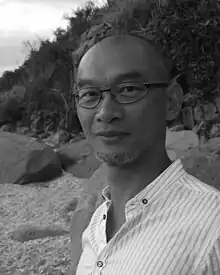Ed Pien
Ed Pien (born February 23, 1958) is a Canadian contemporary artist, known for his drawings and large-scale drawing-based installations inspired by multiple sources (Inuit as well as European and Chinese) and traditions,[1] printmaking, paper cuts and video and photography.[2][3][4]
Ed Pien | |
|---|---|
 | |
| Born | February 23, 1958 Taipei, Taiwan |
| Nationality | Taiwan-born Canadian |
| Education |
|
Life
Pien was born in 1958 in Taipei, Taiwan, emigrating to Canada at the age of 11 with his family.[5] At a young age, he began to draw and feels drawing propels everything he does.[6] He received a Bachelor of Fine Arts from the University of Western Ontario (1982) and a Master of Fine Arts from York University (1984).[7]
Pien lives and works in Toronto, where he was a professor in the John H. Daniels Faculty of Architecture, Landscape and Design at the University of Toronto.[3] He has also been an Artist-in-Residence, Painting and Drawing, Studio Arts at Concordia University, Montreal.[8]
Career
Pien`s practice is drawing-based. For his cut-outs, he uses an X-Acto knife as his drawing tool and traditional Japanese paper,[9][10] or he constructs maze-like spaces using walls of crinkly paper grounds with drawings on them and through these large-scale installations he fashions a conduit into feeling and thought.[11] He also is a photographer. In 2019, the Glenbow Museum (Calgary) held an exhibition titled Ed Pien: Our Beloved of 144 framed photographs of flowers hung together in a monumental, wall-filling installation to commemorate decorated gravesites at a cemetery in Santiago, Chile which is the final resting place for many political dissidents and victims of the reign of Augusto Pinochet between 1973 and 1990.[12] Also in 2019, he made a ghostly new print at NSCAD in collaboration, as he said, with the Atlantic Ocean.[13] In 2020, to bear witness to the disruptions and unease brought on by the pandemic, he concentrated on making his Invasive Species, series of green-coloured drawings inspired by decorative Chinoiserie patterns as well as carefully observed plants and insects thriving in his own garden.[14]
His work has been exhibited extensively throughout Canada and internationally, including, among others, at the Drawing Centre (New York),the Victoria & Albert Museum, London; The Canadian Culture Centre in Paris;[15] Contemporary Art Gallery (Vancouver), the Robert McLaughlin Gallery (Oshawa) partnering with the Southern Alberta Art Gallery and Cambridge Galleries, The Contemporary Art Museum (Monterrey, Mexico), The Goethe Institute (Berlin),[16] the 18th Edition of the Sydney Biennale and the 5th edition of the Moscow Biennale.[17] The Corridor of Rain was featured at the Curitiba Biennial, in Brazil in 2018.[15] In 2022, he showed Present: Past/Future at the Art Gallery of Ontario, a multisensory environment, which captured moments and memories of elders in Havana, Cuba which he had collected since 2014.[15] It marked a change in his work into documentary film and portrait photography.[18]
Selected public collections
Pien's work is held internationally in the collections of over twenty-five museums, including the National Gallery of Canada,[19] the Art Gallery of Ontario, the Montreal Museum of Fine Arts, the Centrum Beeldende Kunst (the Netherlands), Museo de Arte y Diseno Contemporaneo (Costa Rica) and the Ordos Art Museum (Mongolia, China).[20]
Publications
- Pien, Ed; Beaudry, Eve-Lyne (2010). Ed Pien: l'antre des délices = haven of delight. Joliette, Québec: Musée d'art de Joliette.
References
- Clément, Éric (17 February 2014). "Ed Pien et le nouvel univers inuit". La Presse. Retrieved 27 May 2016.
- Delgado, Jerome (6 October 2018). "Ed Pien and his ghosts: twenty years of drawings". www.ledevoir.com. Le Devoir, Oct 6, 2018. Retrieved 14 July 2021.
- Catherine de Zegher (30 June 2016). Ed Pien: Luminous Shadows. Black Dog Publishing. ISBN 978-1-910433-96-6.
- Yishu: Journal of Contemporary Chinese Art. Art & Collection Group. 2007.
- "Artist/Maker Name "Pien, Ed"". Canadian Heritage Information Network. Retrieved 27 May 2016.
- Enright, Robert. "The Art of Being What It Doesn't Have to Be: An Interview with Ed Pien". bordercrossingsmag.com. Border Crossings 115, Sept 2010. Retrieved 14 July 2021.
- "Ed Pien: The Promise of Solitude". Koffler Centre of the Arts. Retrieved 27 May 2016.
- "Ed Pien". www.concordia.ca. Concordia University, Montreal. Retrieved 13 July 2021.
- "SHADOW PUPPETS". ago.ca. Art Gallery of Ontario. Retrieved 14 July 2021.
- "Field Trip: Artist Talk with Ed Pien". www.youtube.com. You Tube/ Art Gallery of Greater Victoria. Retrieved 14 July 2021.
- Rodgers, Margaret. "Ed Pien: In a Realm of Others". www.erudit.org. Espace Sculpture, (74), 41–42. Retrieved 17 August 2020.
- "Ed Pien Our Beloved". www.glenbow.org. Glenbow Museum. Retrieved 14 July 2021.
- Hosein, Lise. "Article". www.cbc.ca. Retrieved 21 October 2023.
- "Ed Pien". www.youtube.com. You Tube. Retrieved 13 July 2021.
- "Ed Pien: Present: Past/Future". ago.ca. Art Gallery of Ontario. Retrieved 15 July 2022.
- "Ed Pien". www..org. Musée Joliette. Retrieved 12 July 2021.
- "Conversations in Contemporary Art Presents Ed Pien". Concordia University. Retrieved 27 May 2016.
- "Ed Pien: Past, Present, Future". www.gallerieswest.ca. Galleries West Magazine. 25 July 2022. Retrieved 28 July 2022.
- "Collections: Ed Pien 1958 -". National Gallery of Canada. Retrieved 29 May 2016.
- "Ed Pien". www.cacnart.com. Canada and China Contemporary Art Communications. Retrieved 12 July 2021.
Further reading
- de Zegher, Catherine (2016). Ed Pien : luminous shadows. London, Ontario: Black Dog and McIntosh Art Gallery.
- Jansma, Linda; Hatt, Gordon; Kellman, Tila Landon (2005). Ed Pien: in a realm of others. Lethbridge, Alta.: Southern Alberta Art Gallery.